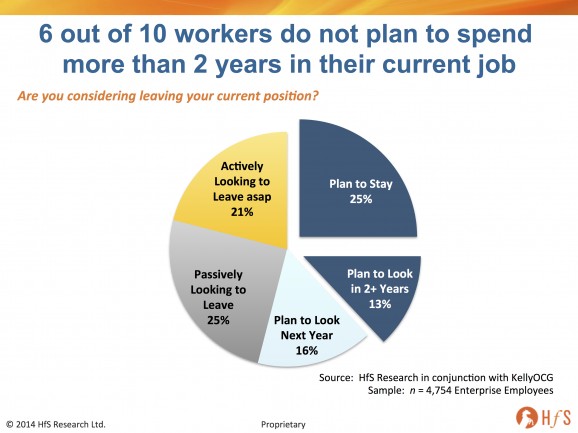 Our new research reveals the majority of enterprises are failing to develop the talent they need to be effective in the Digital Economy.
Our new research reveals the majority of enterprises are failing to develop the talent they need to be effective in the Digital Economy.
Working environments have become increasingly difficult to manage and too many staff are simply not motivated to drive value to their firms. Simply put, the old way of managing staff in today’s self-entitled employment world is just no longer working, and there needs to be a significant mindset change from both employers and their staff to re-humanize the enterprise. Otherwise, the ROI of hiring people will really become unattractive.
When I penned the now-infamous post “Welcome to the age of Digital cruelty, where two-thirds of operational jobs are under threat“, I was thinking about how enterprises can develop change programs to reorient staff to add more “Digital Value” to their organizations, and how they can leverage their partner relationships to help plug the Digital gaps and improve their existing talent potential.
Then HfS’ workforce and talent analyst, Christa Degnan Manning, shared her insights with her new Talent Acquisition Services Blueprint, which brought forward many of the issues surrounding talent retention and creating a work environment where (motivated) staff can develop their careers with their employers with a long-term goal in mind.
So we revisited our recent workforce study which covered 5,000 enterprise employees globally, to understand how motivated today’s talent is to stick with its current employers:
Barely 4 out of 10 staff intend to stick with their employer for more than a couple of years
Ouch. Yes, people, the day of the long term company job is truly dying on the vine, where close to half of today’s workers are already looking for a new employer, while another third are readying to move on in another year or two. At the same time, as our recent State of Outsourcing Study fleshed out, two-thirds of enterprises feel their existing operations talent is falling well short in “Digital” areas such as analytical capability, being creative with new ideas, driving better automation etc. So what does all this mean?
Poor talent leadership and unmotivated staff is a recipe for corporate failure
It’s becoming abundantly clear that many staff that stay with a single employer for too long are losing relevancy, when it comes to delivering new value and insights. This is because most employers are clearly failing in reorienting existing – or hiring new – talent to stay ahead of the curve and keep adding value beyond routine transactional activities. Moreover, the majority of staff are clearly not being motivated by their employers to want to build long-term careers in a single company anymore (or may just not be motivated at all).
Clearly, there is a major employer-employee breakdown occurring: employers are not focused on investing in the right talent strategies, and their talent isn’t that focused on investing their careers in them either. The result is management being pissed off with the value their staff are delivering, and their staff being pissed off with the value they get from their organization – it’s a recipe for failure and poor enterprise performance. And if internal labor investments are fast becoming a negative commodity for many firms, they will naturally look elsewhere to achieve its goals – such as improving automation and leveraging third party services relationships, where the talent can quickly plug the gaps.
The old ‘nine-to-five job mentality’ must quickly evolve into a value-based work culture for organizations with emerging Digital Cultures
Simply put, most effective workers today do not start work at nine and clock-off at five. As peoples’ personal lives become digitally-entwined with their professional responsibilities, most want to spend time during the day on their electronically-driven social activities, which means they frequently need to compensate for this during their evenings and weekends. Moreover, the working styles of management and staff need to evolve to become most outcome-focus and less task-focused.
Managers need to think less about “what do Jane or Peter actually do between nine and five” and more about “what business outcomes have Jane and Peter produced for the firm this week – and how are they adding value to the organization.” This means that enterprises need to ensure they have forward-thinking managers who understand the shifting mindsets and lifestyles of their staff in order to get the best out of them.
Workers who cannot motivate themselves to add value beyond ‘just enough not to get fired’ will see their career potential rapidly decline
It is also the responsibility of employees to adapt to being judged more on outcomes than “time served”. There are far too many staff today who still “work the nine to five mentality” but barely spend 2-3 hours today actually working (we all know many, I am sure!). These people need to understand they will be quickly replaced if they cannot adapt their working styles and motivate themselves to add value. From my experience, staff become motivated when they are encouraged to use their creative energies and are judged on the quality of their outcomes – when they are simply checking the boxes and doing just enough not to get fired, is when the employment model falls apart. I would bet a champagne lunch on the fact that most of the 62% of frustrated staff only do barely enough for their employer to avoid the sack.
The Bottom-line: The working cultures and attitudes of management and their staff both need to evolve to be effective in the Digital Enterprise
The current employment model is broken. There is a sense of entitlement among too many workers that all they need to do is show up to warrant their paycheck and all the accompanying benefits. At the same time, there is too much legacy management going on, where enterprise leaderships persist in judging their staff on effort-based inputs, as opposed to value-based outputs. Yes, the old “time sheet” for knowledge workers is probably the worst invention for the enterprise since on-premise ERP software…
I recall when I graduated in ’94 during the pit of an economy and you couldn’t find a job anywhere – you had no choice but to hustle and adapt to whatever job you could get not only to build your career, but also to earn a living. My first job was answering the phone is a burglar alarm firm – you turned up, you worked hard and you kept at it until something better came along. Sadly, that “hustle mentality” is clearly shot in today’s workforce – I find people either want to work, or they don’t – and smart employers are figuring that out in today’s much looser, more complex, work environment. You basically need to hire people who want to work and manage them by their outcomes – it’s really that simple.
So there needs to be a significant mindset change from both employers and their staff if we want to re-humanize the enterprise, otherwise we might as well give it all up to the robots…
Posted in : Digital Transformation, HfSResearch.com Homepage, HR Strategy, kpo-analytics, Robotic Process Automation, SaaS, PaaS, IaaS and BPaaS, smac-and-big-data, Social Networking, Sourcing Best Practises, sourcing-change, Talent in Sourcing







Phil, your line, “There is a sense of entitlement among too many workers that all they need to do is show up to warrant their paycheck and all the accompanying benefits.” hits the nail squarely on the head for me and most of my customers. If you want to see “shock and awe” tell one of them that the presentation, or materials they put together are crap and they need to do them over again! This is something they are not used to hearing as they always received trophies and accolades for, as you put it, “just showing up.”
Interviewing candidate, while its always been tedious, is now downright painful. Many candidates walk in for an interview and give you multiple reasons not to hire them before you get into the interview! Manners are lacking, courtesy and decorum, are lacking, etc. When you do find those who truly want to work, many lack critical-thinking skills needed for a digital economy.
Scott Klein
Excellent article, Phil. A real wake up call to industry,
Jim
Phil,
Very good insights. You put together some very good recommendations for the change needed in managing workers and developing incentives. Most workers today need to be judged on the outcomes of their work, as opposed to their timesheets,
Abishek Jain
Phil,
The problem lies first and foremost in enterprise leadership. If they can’t create a culture to encourage staff to stay with them and build careers with them, there is a clear issue with the core values of the firm and the learning environments being created for staff. It may simply be that many firms today just do not have the management talent to do this, and outsourcing provides the better option long term for many functions. As you remark, at what point does hiring your own staff become a unattractive option!
Chris
This is not new and also not limited to Digital or Outsourcing:
http://www.gallup.com/poll/165269/worldwide-employees-engaged-work.aspx
@Scott – complete agree too many managers walk on eggshells around their staff, afraid to challenge them to higher levels of performance. Rewarding poor performers by showing a gratitude for their loyalty needs to become a legacy practice. It’s like when company celebrates a staff members anniversary in their firm…”Great – so you’ve been showing up here for 20 years. Let’s reward that behavior”. I find that a disincentive for other staff… public recognition should be for raising the bar, not just turning up 😉
PF
@Carole – Agree the worker disengagement is nothing new. Digital exposes the need for companies to up skills their workforces. Outsourcing provides an avenue to use third parties to plug the skills gaps.
Phil
Digital is new for both employees & the employers. Until we are truly “digital”, frustrations cannot be overruled!
If the third parties have the skills, fine – it always depends on what you need. I don’t see engagement and commitment actually as a skill but as an indicator for the health of relationships and the state of corporate culture,
Carola
The problem with managing people for their outcomes is that many organizations say the know what outcomes are expected, but these organizations don’t behave that way or incorporate expected outcomes into a thorough business strategy. Let’s start with an easy one- customer retention. All of us should have a hand in this.
What can each and every one of us do to retain our customers? Referrals: how do we get more employees to ask for referrals?
Environmental advocacy; how can cost cutting conservation be done at every level of an organization?
The list goes on and on. Outcomes should be an exciting challenge. Milestones should be set, measured , reached , breached, and reset. All of us who have had the pleasure of working in these kinds of environments know that these firms are very hard to leave.
[…] (Cross-posted @ Horses for Sources) […]